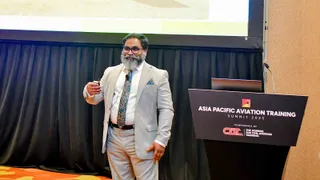US House Forms Bipartisan AAM Caucus
Contact Our Team
For more information about how Halldale can add value to your marketing and promotional campaigns or to discuss event exhibitor and sponsorship opportunities, contact our team to find out more
The Americas -
holly.foster@halldale.com
Rest of World -
jeremy@halldale.com

More than 20 US House of Representative members have launched the bipartisan Congressional Advanced Air Mobility (AAM) Caucus. Marty Kauchak outlines their purpose.
Congresswoman Dina Titus, representing the Las Vegas, Nevada region, told CAT: "The Advanced Air Mobility Caucus will help ensure continued US leadership in the sustainable future of flight and educate members about revolutionary AAM technology.
"As Co-Chair of the Unmanned Systems Caucus," she added, “I continue to work with my colleagues and industry stakeholders to promote the safe integration of UAS operations into the national airspace. The drone industry, specifically in Nevada, is rapidly advancing and serves as a vital economic driver in the global marketplace. I will continue to champion provisions that support our aviation workers, provide consumer protections for travelers, and make critical advancements for the drone industry.”
Congressional caucuses are established to bring together House members from across the political divide and different states to focus attention on, and more significantly, generate solutions, to current and emerging national policy challenges. In the case of the AAM Caucus, this new Congressional group was established to educate members of Congress and the public about AAM technologies, associated societal benefits, and regulatory updates needed to promote this revolutionary technology.
The AAM Caucus has huge opportunities to help ensure the US Congress is engaged in, and when necessary, provide legislative direction to address the rapidly evolving challenges and opportunities emerging across the sector. Two of many prominent, nascent policy issues on the US AAM sector’s roadmap familiar to CAT readers include eVTOL pilot training standards and certification and eVTOL infrastructure development.
The House recently passed the Advanced Aviation Infrastructure Modernization Act (AAIM Act), HR 6270, which authorizes funding to plan for and eventually build new AAM infrastructure by leveraging existing vertiports and other public transportation facilities to support AAM operations.
Similar legislation (S.4246) authorizing AAM planning grants was introduced in the Senate by Alex Padilla (D-CA) and Jerry Moran (R-KS) and recently approved by the Senate Commerce Committee.
Founding members of the Congressional AAM Caucus include Reps. Gus Bilirakis (R-FL), Julia Brownley (D-CA), Kat Cammack (R-FL), Salud Carbajal (D-CA), Buddy Carter (R-GA), Rick Crawford (R-AR), Sharice Davids (D-KS), Byron Donalds (R-FL), Neal Dunn (R-FL), Jake Ellzey (R-TX), Bill Foster (D-IL), Scott Franklin (R-FL), Mike Garcia (R-CA), Garret Graves (R-LA), Doug Lamborn (R-CO), Michelle Steel (R-CA), Dina Titus (D-NV), David Valadao (R-CA), and Bruce Westerman (R-AR),
The co-chairs of the new caucus are Reps. Jay Obernolte (R-CA) and Jimmy Panetta (D-CA). Obernolte is a licensed airline transport pilot and certified flight instructor, while Panetta is a member of the House Ways & Means Committee, and is working on ideas to address AAM charging stations.
“Advanced air mobility innovations like electric vertical takeoff vehicles show promise as new modes of sustainable transportation for commercial and private use,” Panetta said. “This bipartisan caucus will broaden awareness of the industry at the federal level and foster future partnerships with members on both sides of the aisle. Supporting this cutting-edge aviation technology will cut emissions, provide more efficient transportation options, and create thousands of high-skilled manufacturing jobs.”
The start-up of this new caucus has gained support and endorsements from the National Business Aviation Association (NBAA), Aircraft Owners and Pilots Association (AOPA), National Air Transportation Association (NATA), Aerospace Industries Association (AIA), Helicopter Association International (HAI), National Association of State Aviation Officials (NASAO) and General Aviation Manufacturers Association (GAMA).


